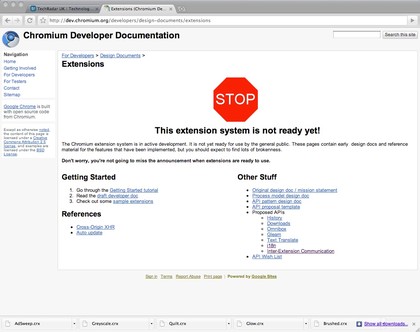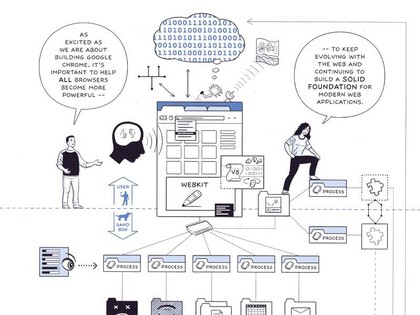Google Chrome: one year on
How has Chrome shaped up since its launch a year ago?

When Google unveiled the beta of its Chrome browser one year ago today, there were two explanations for its appearance. The official reason, as stated by Google in the official blog, was that "the web gets better with more options and innovation. Google Chrome is another option, and we hope it contributes to making the web even better."
The unofficial reason, as stated by pretty much everybody, was that Google wanted to own the browser market the way it owns search. So how is it doing?
To date, Chrome has been a modest success. It's achieved just under 3% market share (NetApplications gives it 2.84%), which puts it ahead of Opera and just behind Apple's Safari, which isn't bad going for something that's just twelve months old.
The Linux and Mac versions are imminent and Google has just inked a deal with Sony to stuff Chrome into new Vaio PCs, so the numbers should jump up pretty soon. It's hardly world domination - Firefox has ten times the users, and Internet Explorer has even more - but it's not a bad start.
The browser itself is still pretty basic, however. The extensions API still isn't here - it exists, but it isn't in the official browser release - so there isn't a Firefox-style ecosystem of add-ons, and Themes are also in beta.

OFFPUTTING: The lack of extensions can put power users off, but there is an API (shown here in Chromium for the Mac) and Chrome will support them soon
Another possible new feature, desktop notifications, is currently in the Chromium documentation and has yet to be baked into the final browser.
Get daily insight, inspiration and deals in your inbox
Sign up for breaking news, reviews, opinion, top tech deals, and more.
We have mixed feelings about Chrome. As an everyday browser for the average punter it's great, but it won't satisfy the ad-blocking, plug-in-packing power user just yet - and other browsers have been catching up with Chrome's speed.
Safari in particular is lightning fast these days, and Firefox isn't too far behind. We haven't benchmarked the final release of Opera 10 yet, but that promises faster performance, too.
Then again, that's perhaps the point. In the Scott McCloud comic book that announced Chrome this time last year, Google explained that "it's important to help all browsers to become more powerful, to keep evolving with the web and continuing to build a solid foundation for modern web applications… we hope people will take some of these ideas too; challenge them, build on them and keep moving the web forward."

IN PICTURES: Scott McLoud's comic strip outlined Google's philosophy
Chrome might not have Safari's market share just yet, let alone Firefox's or Internet Explorer's, but in the year since its release all the major browsers have improved significantly - and in particular, JavaScript performance has been improving in leaps and bounds.
JavaScript means web applications, and of course one of the biggest player in web applications begins with "G" and ends in "oogle". Google doesn't really care which browser you use to access its services, provided it's Google's services that you're accessing. On that basis, then, Chrome's mission is largely accomplished.
There is, of course, a bigger picture: Chrome OS, the web-based operating system that will be built around the browser. It's still vapourware, but details are beginning to leak - and according to Download Squad it sounds an awful lot like a bootable browser rather than a bloated, do-everything OS.
We don't expect Chrome to be a serious rival to Windows for some time yet, if at all, but when it starts to turn up on netbooks things could get very interesting indeed.
For the last year Chrome has been learning to walk; now, it's getting ready to run.
Writer, broadcaster, musician and kitchen gadget obsessive Carrie Marshall has been writing about tech since 1998, contributing sage advice and odd opinions to all kinds of magazines and websites as well as writing more than a dozen books. Her memoir, Carrie Kills A Man, is on sale now and her next book, about pop music, is out in 2025. She is the singer in Glaswegian rock band Unquiet Mind.
